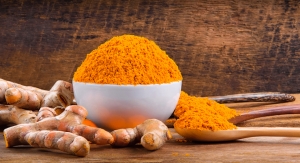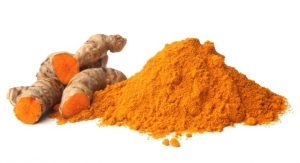04.24.17
In a first-of-its-kind study, published April 11 in Nature: Scientific Reports, scientists at the Baylor Scott & White Research Institute and Sammons Cancer Center, Baylor University Medical Center, Dallas, Texas, reported that curcumin combined with turmeric essential oil is significantly more powerful than curcumin alone in attenuating the disease activity in an experimental mouse model of colitis. Ulcerative colitis is a major chronic inflammatory bowel disease affecting the entire colorectum.
“This is the first study that highlights the superiority of curcumin combined with essential turmeric essential oils (curcumin-ETO) over standard curcumin. We have shown that although curcumin works in this animal model of colitis, the essential oils delivered with the curcumin make it much more effective. There is a growing body of data that indicate that the essential turmeric oils, containing compounds called turmerones, also possess significant anti-inflammatory properties,” said corresponding author Ajay Goel, PhD, director, Center for Gastrointestinal Research and Director, Center for Translational Genomics and Oncology, Michael A Ramsay Chair in Cancer Genomics at the Baylor Scott & White Research Institute and Charles A. Sammons Cancer Center.
The study used BCM-95 Curcumin, which is a patented complex of curcumin and essential turmeric oils (ETO) compared to Sigma’s standard curcumin.
While both curcumin and curcumin with essential turmeric oil reduced the severity of colitis, the curcumin ETO group was significantly better at maintaining a healthy body weight, and showed a significant trend to less severe intestinal bleeding.
“Though the ETO-curcumin was better absorbed than plain curcumin, its beneficial activities were not solely the result of absorption, but rather the anti-inflammatory synergism of both compounds. Collectively, these data indicate that ETO-curcumin resulted in superior anti-inflammatory effects compared to standard curcumin, suggesting that the presence of ETO may synergistically enhance the bioactivity of curcumin in the colon,” Dr.. Goel stated.
Past human and animal studies have shown the anti-inflammatory and anti-cancer activity of ETO-curcumin, but this is the first time it has been compared directly with curcumin to examine the magnitude of increased activity.
The study concluded: “First, we confirmed anti-inflammatory properties of curcumin on the disease activity index in an animal model of DSS-induced colitis. Second, our data indicates that ETO curcumin displayed a superior anti-inflammatory efficacy than that of standard curcumin and the subsequent mathematical analysis revealed that the ETO-curcumin associated anti-inflammatory effects were particularly pronounced at higher doses. Third, further investigation of the mechanisms by which ETO-curcumin exerted anti-inflammatory effects showed that ETO curcumin upregulated anti-inflammatory cytokines including IL-10 and IL-11 and suppressed the chemokine CCL17 when compared to standard curcumin.”
“This is the first study that highlights the superiority of curcumin combined with essential turmeric essential oils (curcumin-ETO) over standard curcumin. We have shown that although curcumin works in this animal model of colitis, the essential oils delivered with the curcumin make it much more effective. There is a growing body of data that indicate that the essential turmeric oils, containing compounds called turmerones, also possess significant anti-inflammatory properties,” said corresponding author Ajay Goel, PhD, director, Center for Gastrointestinal Research and Director, Center for Translational Genomics and Oncology, Michael A Ramsay Chair in Cancer Genomics at the Baylor Scott & White Research Institute and Charles A. Sammons Cancer Center.
The study used BCM-95 Curcumin, which is a patented complex of curcumin and essential turmeric oils (ETO) compared to Sigma’s standard curcumin.
While both curcumin and curcumin with essential turmeric oil reduced the severity of colitis, the curcumin ETO group was significantly better at maintaining a healthy body weight, and showed a significant trend to less severe intestinal bleeding.
“Though the ETO-curcumin was better absorbed than plain curcumin, its beneficial activities were not solely the result of absorption, but rather the anti-inflammatory synergism of both compounds. Collectively, these data indicate that ETO-curcumin resulted in superior anti-inflammatory effects compared to standard curcumin, suggesting that the presence of ETO may synergistically enhance the bioactivity of curcumin in the colon,” Dr.. Goel stated.
Past human and animal studies have shown the anti-inflammatory and anti-cancer activity of ETO-curcumin, but this is the first time it has been compared directly with curcumin to examine the magnitude of increased activity.
The study concluded: “First, we confirmed anti-inflammatory properties of curcumin on the disease activity index in an animal model of DSS-induced colitis. Second, our data indicates that ETO curcumin displayed a superior anti-inflammatory efficacy than that of standard curcumin and the subsequent mathematical analysis revealed that the ETO-curcumin associated anti-inflammatory effects were particularly pronounced at higher doses. Third, further investigation of the mechanisms by which ETO-curcumin exerted anti-inflammatory effects showed that ETO curcumin upregulated anti-inflammatory cytokines including IL-10 and IL-11 and suppressed the chemokine CCL17 when compared to standard curcumin.”


















